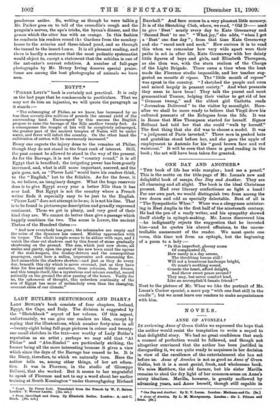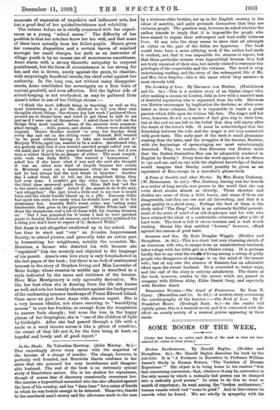NOVELS.
ANNE OP AVONLEA.t
IN reviewing Anne of Green Gables we expressed the hope that the author would resist the temptation to write a sequel to that delightful story. We had no great confidence that such a counsel of perfection would be followed, and though not altogether convinced that the author has been justified in disregarding it, we are quite ready to acquiesce in her decision in view of the excellence of the entertainment she has set before us. Anne of Avonlea is not as good as Anne of Green Gables, but it is a most genial, fresh, and wholesome book. We miss Matthew, the old farmer, but his sister Marina remains to shed the dry light of her common-sense on. Anne's misty idealism. Manilla, however, is greatly mellowed, by advancing years, and Anne herself, though still capable in 'One Day and Another. By E. V. Lucas. London: Methuen and Co. [5s.] t Anne of Avonlea. By L. X. Montgomery. London : Sir I. Pitman and Sons. [6s3
moments of expansion of impulsive and indiscreet acts, has lost a good deal of her quicksilverishness and volubility.
The volume before as is chiefly concerned with her experi- ences as a young "school marm." The difficulty of her position is that her scholars know her too well, and that some
of them have actually been her fellow-pupils. Hence, given her romantic disposition and a certain leaven of mischief amongst her small charges, her path as an instructor of village youth is by no means one of monotonous smoothness.
Anne starts with a strong theoretic antipathy to corporal punishment, but the force of circumstances is too strong for her, and she is driven, sorely against the grain, to chastise, with surprisingly beneficial results, the chief rebel against her authority. In the long run, not without many disappoint- ments, Anne establishes her sovereignty on a firm basis of mutual goodwill, and even affection. But the lighter side of school-keeping is not overlooked, as may be gathered from Anne's letter to one of her College chums :—
" I think the most difficult thing in teaching, as well as the most interesting, is to get the children to tell you their real thoughts about things. One stormy day last week I gathered them around me at dinner hour and tried to get them to talk to me just as if I were one of themselves. I asked them to tell me the things they most wanted. Some of the answers were common- place enough. . . dolls, ponies, and skates. Others were decidedly original. Hester Boulter wanted to wear her Sunday dress every day and eat in the sitting room.' Hannah Bell wanted `to be good without having to take any trouble about it.' Marjory White, aged ten, wanted to be a widow. Questioned why, she gravely said that if you weren't married people called you an old maid, and if you were your husband bossed you; but if you were a widow there'd be no danger of either. The most remark- able -wish was Sally Bell's. She wanted a honeymoon.' I asked her if she knew what it was and she said she thought it was an extra nice kind of bicycle because her cousin in Montreal went on a honeymoon when he was married and he had always had the very latest in bicycles' Another day I asked them all to tell me the naughtiest thing they had ever done. I couldn't get the older ones to do so, but the third class answered quite freely. Eliza Bell had set fire to her aunt's carded rolls.' Asked if she meant to do it she said, 'not altogether.' She just tried a little end to see how it would burn and the whole bundle blazed up in a jiffy. Emerson Gillis had spent ten cents for candy when he should have put it in his missionary box. Annetta Bell's worst crime was 'eating some blueberries that grew in the graveyard.' Willie White had slid down the sheephouse roof a lot of times with his Sunday trousers on.' 'But I was punished for it 'cause I had to wear patched pants to Sunday School all summer, and when you're punished for a thing you don't have to repent of it,' declared Willie."
But Anne is not altogether swallowed up in her school. She has time to start and " run " an Avonlea Improvement Society, to attend picnics, and generally take an active part in humanising her neighbours, notably the eccentric Mr. Harrison, a farmer who deserted his wife because she "regulated" him too severely and objected to the language of his parrot. Anne's own love story is only foreshadowed in the last pages of the book ; but there is no lack of sentimental interest in the story of Stephen Irving and Miss Lavendar of Echo Lodge, whose reunion in middle age is described in a style indicated by the name and residence of the heroine. Here Miss Montgomery is only agreeably derivative. We
like her best when she is drawing from the life she knows so well, and sets her homely characters against the background of the enchanting summer landscape of Prince Edward Island.
Once more we part from Anne with sincere regret. She is a very human idealist, not above resorting to "beautifying messes" to cure her freckles, or exempt from the temptation to answer fools sharply ; but none the less, in the happy phrase of her biographer, she is "one of the children of light by birthright. After she had passed through a life with a smile or a word thrown across it like a gleam of sunshine, the owner of that life saw it, for the time being at least, as hopeful and lovely and of good report."

























































 Previous page
Previous page